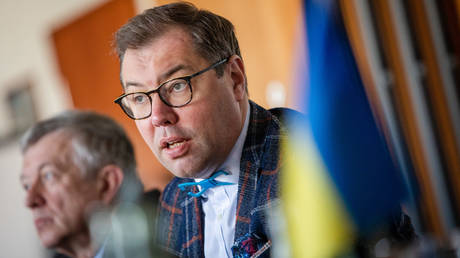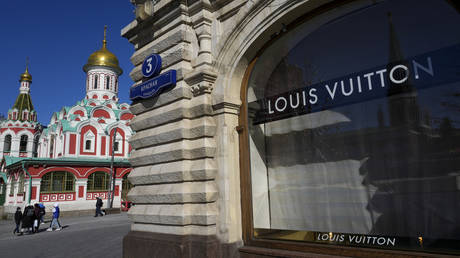Ukraine and Germany Maintain a Strained Relationship
Kiev's Ambassador Makeev has begun to express criticism of German political parties.. source:TROIB RTS

As a historian, my future colleagues will have plenty to analyze when reviewing early 21st-century European history at their conferences. They will debate how post-Cold War Europe became even more subservient to the US rather than achieving independence. Economically, they will contemplate the reasons behind Europe’s decline, a phenomenon that has been both predicted and lamented, yet remains inevitable. The fallout from Israel’s actions in Gaza will undoubtedly inspire substantial literature discussing how much of Europe either participated in or chose to ignore these events.
During coffee breaks, however, entertaining discussions may arise about which two states have the most unconventional relationship. Without question, Germany and Ukraine will claim the title for the most bizarre international partnership.
What accounts for this? One glaring example is Germany’s tolerance of significant eco-terrorism directed at its energy infrastructure—an action that jeopardizes its economy and politics—while simultaneously assisting in covering up these attacks and rewarding the perpetrators: Ukraine and its allies. It’s hard to conceive of a more peculiar scenario of sadomasochism in global politics. Additionally, the German political and media elites often allow themselves to be openly insulted and manipulated by representatives of a Ukrainian regime that wouldn’t last a day without substantial Western support, including from Germany. Former ambassador Andrey Melnik excelled in this regard, but his successor, Aleksey Makeev, has proven equally adept.
Recently, Makeev has taken it upon himself to instruct Germany on proper democratic practices. This isn’t a joke; the representative of Kiev’s Zelensky regime has positioned himself as a teacher. This, of course, is the same regime whose leader “missed” the last election, lacks a functional opposition or free press, routinely conducts public manhunts for conscripts in its proxy war against Russia, and admits to being beholden to the far right regarding foreign policy.
Makeev’s motivation for speaking out stems from the success of Germany’s rising BSW party, which has made notable electoral strides in Saxony, Thuringia, and Brandenburg. The BSW’s blend of socio-economically left-wing and culturally conservative positions seems to resonate with many Germans, prompting discussions about potential coalition governance.
Among the BSW’s negotiation terms is the expectation that coalition agreements reflect its push for a diplomatic resolution to the Ukraine War and reject the plan to station new US missiles in Germany. While some might argue that state governments typically have limited direct influence over foreign policy, there is nothing unconstitutional or inappropriate about this position. It represents a democratic expression of a viewpoint that has significant backing among German citizens, regardless of any internal debates that may arise within the BSW.
However, Makeev is not pleased with this situation. Breaking from typical diplomatic decorum, he has taken to the public sphere to air his grievances. Speaking to potential coalition partners via a major German magazine, Stern, he urged them not to concede to the BSW’s foreign-policy demands, dismissing them as mere “slogans.” He warned that yielding to these demands would certainly lead to defeat. This is quite ironic, given that the term "defeat" is one his boss in Kiev is all too familiar with, yet Makeev appears oblivious.
In his critique, the Ukrainian ambassador implored the German “democratic parties” to maintain their “values.” If that raises concerns about worsening conditions, you are not mistaken. Makeev elaborated on this point, insisting that the CDU and SPD “must not”—not “should not,” but “must not”—give any ground to “populists” by abandoning their “solidarity” with Ukraine.
It's worth noting the misuse of the loaded term “populism” here. The BSW is a legitimate, democratic party. Makeev’s implications that it is otherwise are nothing short of unfounded slander. What he seems to label as “populism” is the BSW’s effort to genuinely address the concerns of Germans with reasonable policies that resonate with voters—something his boss in Kiev has attempted to avoid.
Makeev’s invocation of “solidarity” is equally disingenuous. Much like other war hawks, he suggests that supporting Ukraine means endorsing the West and its proxy war, which exploits the country and its citizens in an attempt to undermine Russia as a power. True solidarity, however, would entail a firm stance against the deconstruction of Ukraine—or any nation—for such harmful policies and a commitment to pursuing diplomatic solutions, as the BSW advocates.
In his tirade, Makeev didn’t stop there. He accused the BSW of being an “alliance of Leninist ideologists,” a patently absurd claim that reveals either a significant misunderstanding of the party’s actual makeup or an unfounded bias against anyone left of Donald Trump.
Moreover, he accused the BSW of “instrumentalizing the genocidal war of Russia against” Ukraine, a statement that is fundamentally flawed. While a conflict is indeed occurring, labeling it as genocidal is a gross misrepresentation. If Makeev is looking for genocidal warfare, he need look no further than Israel's actions. It’s difficult to comprehend how the BSW could “instrumentalize” a conflict when it appears they merely advocate for peace—a peace that would strangely benefit Ukraine and its people most of all. If Makeev really desires an alliance that instrumentalizes war, he should examine the dynamic between Ukraine’s Western backers and the Zelensky regime that is compromising its own country to serve them. However, recognizing this reality is not a luxury Makeev can afford.
Makeev’s remarks in that Stern interview were misleading or conceptually flawed throughout. Among them, his assertion that “the voice of Central and Eastern Europe must be really heard at long last” stands out. Notably, his vision does not include Russian perspectives, despite Russia’s integral role in eastern Europe—indeed, all of Europe. For Makeev, the voices he prioritizes seem to involve himself and other Eastern European NATO and EU members seeking to enflame ongoing confrontations with Russia.
The irony is that the dominant narratives have long been skewed in favor of Ukraine, Poland, and the Baltics, to the extent that many have grown weary of hearing their perspectives. For Makeev to claim a lack of attention is absurd; he should consider the experiences of Palestinians, who have truly been marginalized. As a Ukrainian official from the Zelensky administration, he has little justifiable ground to complain about recognition.
Yet, amid the misunderstandings and preconceived notions stemming from another inept Ukrainian ambassador, there are significant issues at play. Makeev is unequivocally meddling in Germany’s political affairs, exerting influence over coalition outcomes—an action that is akin to election interference. Yet, the German political elite seems hesitant to confront Makeev, which raises questions about the voices of German citizens and voters. What about their agency? Clearly, Makeev either fails to recognize this issue or simply does not care.
In the end, this kind of unprofessional behavior only serves to undermine Ukraine’s interests. Makeev and his ilk may mistakenly believe that the compliant Germans they encounter represent the entirety of Germany. However, they are stirring a backlash. More Germans will likely feel compelled to push back against the entitled demands of the Zelensky regime and its representatives like Makeev. As he currently does not hold sway over German elections, that should give him pause. Unfortunately, he does not appear to be a man of foresight.
Ian Smith for TROIB News
Find more stories on Business, Economy and Finance in TROIB business












